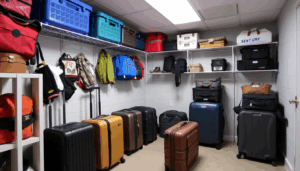In the hospitality industry, guest satisfaction is the cornerstone of success, and effective Hotel Training Strategies play a pivotal role in achieving this goal. When guests feel valued and their needs are met or exceeded, they are more likely to return, leave positive reviews, and recommend the hotel to others. As competition in the hospitality sector continues to grow, it is essential for hotels to focus on Hotel Training Strategies that enhance guest satisfaction. Targeted training programs for hotel staff can make a significant difference in creating memorable guest experiences.
This article will explore the best Hotel Training Strategies to improve guest satisfaction and discuss how incorporating specialized processes, such as Deliverback’s Lost and Found management, can elevate the guest experience to new heights.
Why Training is Critical for Guest Satisfaction
A well-trained hotel team is the backbone of excellent service delivery. Hotel Training Strategies ensure that every interaction between hotel staff and guests—whether during check-in, housekeeping, or issue resolution—contributes positively to the guest’s overall experience. Here are a few reasons why Hotel Training Strategies are essential for enhancing guest satisfaction:
- Improved Communication Skills: Training programs help staff communicate more effectively with guests, which is vital for guest satisfaction.
- Increased Efficiency: Efficient Hotel Training Strategies reduce wait times for guests and ensure smooth operations, leading to better guest experiences.
- Enhanced Problem-Solving Capabilities: Effective Hotel Training Strategies equip staff to handle guest complaints proactively, turning potentially negative situations into positive outcomes.
- Consistent Service Delivery: Hotel Training Strategies ensure that all staff members deliver a consistent level of service, which is critical for building a strong brand reputation.
- Higher Employee Morale: Employees who benefit from Hotel Training Strategies feel more confident, leading to increased job satisfaction and reduced turnover.
Key Hotel Training Strategies to Enhance Guest Satisfaction
When developing Hotel Training Strategies, it’s crucial to cover a broad range of areas that impact the guest experience. Here are some key Hotel Training Strategies that hotels can implement:
- Comprehensive Onboarding Program: An effective onboarding program is a fundamental Hotel Training Strategy that familiarizes new employees with the hotel’s values, mission, and service standards.
- Customer Service Excellence: A core focus of Hotel Training Strategies should be customer service training, emphasizing how to handle difficult guests and provide personalized service.
- Cross-Departmental Training: One of the more versatile Hotel Training Strategies, cross-departmental training helps employees understand the responsibilities of other departments, fostering better teamwork.
- Technology and Software Training: As technology evolves, incorporating software training into Hotel Training Strategies ensures staff can leverage tools like Property Management Systems (PMS) and CRM systems effectively.
- Lost and Found Management Training: Including training on systems like Deliverback in Hotel Training Strategies can turn a potentially negative guest experience into a positive one.
Incorporating Deliverback into Lost and Found Training to Enhance Guest Satisfaction
Deliverback is a specialized platform that supports Hotel Training Strategies by helping hotels manage and return lost items efficiently. Training front office staff to use Deliverback effectively is a key Hotel Training Strategy that can significantly enhance guest satisfaction:
- Streamlined Process: Hotel Training Strategies that integrate Deliverback allow staff to register lost items quickly, making the process seamless for guests.
- Automated Notifications: Deliverback’s features align with Hotel Training Strategies by providing guests with timely updates about their lost items, reducing anxiety.
- Efficient Shipping and Tracking: As part of Hotel Training Strategies, Deliverback’s shipping options offer transparency and choice, which guests appreciate.
- Servicio personalizado: By incorporating Deliverback into Hotel Training Strategies, front office staff can provide a personalized experience for guests.
- Reduced Human Error: Deliverback supports Hotel Training Strategies by automating much of the Lost and Found process, ensuring efficient operations.
Implementing Deliverback Training in the Front Office Department
To maximize Deliverback’s potential, hotels should include it as part of their Hotel Training Strategies for front office staff. The training program should include:
- Introduction to Deliverback: A critical part of Hotel Training Strategies, providing an overview of Deliverback’s features and benefits.
- Step-by-Step Process Walkthrough: Effective Hotel Training Strategies include detailed instructions for using Deliverback’s system.
- Hands-On Practice: Allowing staff to practice with Deliverback is an essential Hotel Training Strategy that boosts confidence.
- Handling Guest Inquiries: Teaching staff to use Deliverback to address guest inquiries is a key part of Hotel Training Strategies.
- Ongoing Support and Refresher Training: Hotel Training Strategies should include regular updates to keep staff proficient with evolving systems like Deliverback.
Measuring the Impact of Hotel Training Strategies on Guest Satisfaction
After implementing Hotel Training Strategies, it’s important to measure their impact on guest satisfaction. Hotels can assess the effectiveness of their Hotel Training Strategies using methods like guest feedback surveys, mystery shopper programs, and performance metrics.
- Guest Feedback Surveys: A valuable tool in assessing Hotel Training Strategies, these surveys measure guest perceptions of staff service.
- Mystery Shopper Programs: These programs provide insights into how well staff apply Hotel Training Strategies.
- Employee Performance Metrics: Tracking performance metrics helps evaluate the impact of Hotel Training Strategies on service quality.
- Guest Reviews and Ratings: Monitoring reviews helps hotels understand how Hotel Training Strategies influence guest experiences.
- Internal Audits and Assessments: Regular assessments ensure Hotel Training Strategies align with evolving guest expectations.
Conclusión
Effective Hotel Training Strategies are invaluable for enhancing guest satisfaction in the hospitality industry. By focusing on comprehensive training programs that cover customer service, cross-departmental collaboration, and technology use, hotels can create a positive and memorable guest experience. Incorporating tools like Deliverback into Hotel Training Strategies further elevates guest satisfaction by providing a seamless way to manage lost items.
Investing in Hotel Training Strategies that emphasize service excellence and innovative solutions like Deliverback can set a hotel apart from competitors and build a loyal guest base. In an industry where guest satisfaction is paramount, effective Hotel Training Strategies are the key to long-term success.


